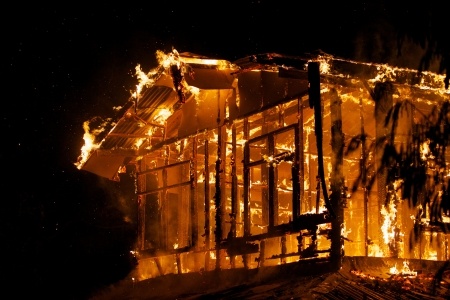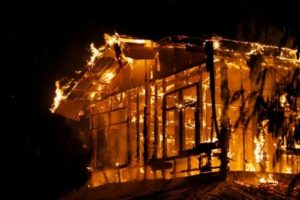
What to do if your Home is Damaged by Fire
Last month devastating fires, scorched over 17,000 acres in the Gatlinburg area of Tennessee. The fire killed 14 people and destroyed 2,013 homes and 53 commercial structures. An additional 244 homes were damaged. Ideal Corporate Housing, headquartered in Knoxville TN, was less than an hour from the fires but felt motivated to pitch in and help their neighbors. So along with our thoughts and prayers for the residents of the area, we donated funds to the American Red Cross, as well as local charities.
Here are some sobering statistics about fire damage in the United States alone. In 2015, there were 1,345,500 fires reported in the United States, 501,500 of these were structural or residential fires. These fires caused 3,280 civilian deaths, 15,700 civilian injuries, and $14.3 billion in property damage. In 2015, a U.S. fire department responded to a fire every 23 seconds. One structure fire was reported every 63 seconds, one home structure fire was reported every 86 seconds, one civilian fire injury was reported every 34 minutes and one civilian fire death occurred every 2 hours and 40 minutes.
If you have been affected by a house fire, whether in the Gatlinburg TN fires or elsewhere, how do you begin to rebuild your life, salvage your belongings and start anew?
Here are some tips on what to do after the house fire has been put out.
 Be Prepared for the Damage resulting from putting the fire out. Your home and belongings that were damaged by fire and smoke, may also now be soggy with the water used to put out the flames. The firefighters may have had to cut holes in the walls or break windows to look for hidden flames or rescue any residents. Also, the fire department may have shut down your utilities (water, electricity and gas) and they cannot be turned back on until the area is declared safe by the fire marshal.
Be Prepared for the Damage resulting from putting the fire out. Your home and belongings that were damaged by fire and smoke, may also now be soggy with the water used to put out the flames. The firefighters may have had to cut holes in the walls or break windows to look for hidden flames or rescue any residents. Also, the fire department may have shut down your utilities (water, electricity and gas) and they cannot be turned back on until the area is declared safe by the fire marshal.- Contact Family Members and Friends. If they heard about the house or area fire on the news, make sure to call them to let them know what happened, if everyone is okay, and any other information necessary. Friends and relatives will more than likely lend a hand in providing lodging, food, childcare and pet sitting, as well as a shoulder to cry on and support you in the long road ahead.
- Get a copy of the report. In most cities and towns, a fire report is public, so make sure to ask for a copy from the fire department or the fire marshal’s office. The fire report will provide you with information your insurance company and other official offices may need. A fire report will discuss what structure the house was in, what area was involved, the time of the incident, the date of the incident and it will have an incident number if it comes through a fire department. This enables the fire department to know all the specifics of who was there and what resources were there, to assist in gathering a lot more information.
- Don’t hesitate to ask for help. There are local disaster relief services put into place for just this reason. The American Red Cross or the Salvation Army will help you find a place to stay (if needed), food, clothing and medicine.
- Use caution when approaching your damaged home. Don’t enter the home or yard until the Fire Department says it’s safe to do so. Fires can reignite or the area may be still too hot to touch or approach, or roofs and floors may be unstable. Once you locate your pets after the fire, handle them carefully and calmly, as they may be scared or panicked after such a stressful event and could even bite you. Find them temporary lodging with a friend or boarding facility after they’ve been checked by your veterinarian.
- Contact the proper authorities post-fire. Call your local police department to tell your home is currently uninhabitable and when you estimate returning. Board up any openings or windows so no one can get in when you’re not there. Then call your insurance company on how to proceed on getting reimbursed for the home and belongings destroyed in the fire. Make a detailed list of all items that were damaged and how much you paid for them. Save all receipts on lodging, replacement or construction costs so you can submit them to the insurance company as well as prove loss on your tax return. Call your mortgage lender next to inform them of the damage. Call credit card companies to get any cards lost in the fire replaced.
- Begin the clean-up process. If not completely destroyed, you may get started on interior clean up. Use caution though – removal of parts or whole of a destroyed house can only be done by professionals. Look through the home to see which belongings can be salvaged, cleaned or repaired. Assess the level of damage and be realistic with your ability to perform the cleaning yourself or if you’ll need professional services. Assess the damage before you begin. Does the damage include soot, ash, charring, smoke or odor? Was a single room affected or is the damage is more extensive? If unsure, leave it alone and call the professionals.
- Get references for Fire Restoration services. You will need reputable companies that will estimate and repair damage and lost belongings, secure your home against further damage, fire and water restoration contractors, and storage facilities for undamaged or repaired household items.
- Begin replacing valuable documents. It will take time but begin the process of replacing valuable documents from the proper authorities including: Driver’s License and Auto Registration from the DMV, checkbooks and bank records, copies of your insurance policies, titles to deeds and mortgage papers, passports, birth, death and marriage certificates, stocks and bonds, wills, medical records, income tax records, animal registration and warranties.
- Find temporary housing while your home is being repaired or rebuilt. Ideal Corporate Housing is the insurance industry’s leading provider of temporary housing in Tennessee, Kentucky and the US when policyholders suffer property damage to their homes. We recognize the importance of taking care of the family’s needs during the time of their crisis while containing, and often times reducing additional living expenses (ALE) and lodging costs. The most critical need for the policyholder is to feel safe and comfortable in their living environment while waiting to return back to their home.
 Our furnished apartments are the best solution in the adjuster’s attempt to provide a “home style” living environment. We recognize the temporary housing must be affordable and fall within the adjuster’s budget for the ALE allocation for the particular claim. Our reservation process is claim-specific to ensure the adjuster accomplishes the cost containment goals.
Our furnished apartments are the best solution in the adjuster’s attempt to provide a “home style” living environment. We recognize the temporary housing must be affordable and fall within the adjuster’s budget for the ALE allocation for the particular claim. Our reservation process is claim-specific to ensure the adjuster accomplishes the cost containment goals.
We discuss with the policyholder their responsibilities and monitor the scheduled departure date. If the allotted time goes beyond the approved time period, we make sure the extension is approved by the adjuster. Call Ideal Corporate Housing (865.266.8224) if you are current displaced from your home due to fire, water or weather damage and we’ll find safe and quality temporary housing in your area.
